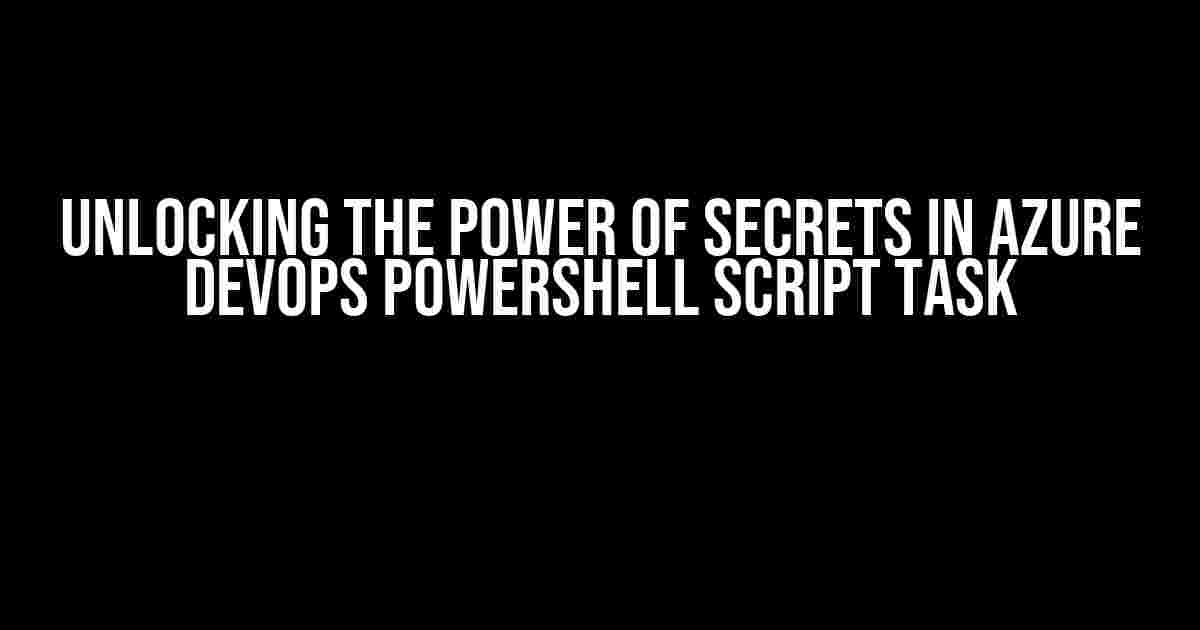Are you tired of hardcoding sensitive information in your Azure DevOps pipelines? Do you want to keep your API keys, connection strings, and other confidential data secure? Look no further! In this article, we’ll dive into the world of secrets in Azure DevOps PowerShell script tasks, and show you how to use them like a pro.
What are Secrets in Azure DevOps?
In Azure DevOps, secrets are encrypted values that can be used in your pipelines to store sensitive information. This can include API keys, connection strings, passwords, and more. By using secrets, you can keep your confidential data safe and secure, while still making it available to your pipeline scripts.
Why Use Secrets in PowerShell Script Tasks?
There are several reasons why you should use secrets in your PowerShell script tasks:
- Security**: Secrets are encrypted, so even if your pipeline is compromised, your sensitive information remains safe.
- Flexibility**: Secrets can be easily updated or rotated without having to modify your pipeline code.
- Reusability**: Secrets can be used across multiple pipelines and scripts, making it easy to standardize your sensitive information.
Creating and Managing Secrets in Azure DevOps
Before we dive into using secrets in PowerShell script tasks, let’s cover how to create and manage them in Azure DevOps.
Creating a Secret Variable
To create a secret variable, follow these steps:
- Navigate to your Azure DevOps project and go to the
Pipelinessection. - Click on the
Variablestab. - Click the
+ New variablebutton. - In the
New variabledialog, enter a name for your secret variable, and select theSecretcheckbox. - Enter the value for your secret variable, and click
OK.
Managing Secret Variables
Once you’ve created a secret variable, you can manage it from the Variables tab:
- Updating a Secret Variable**: Click the three dots next to the secret variable, and select
Edit. Update the value, and clickOK. - Deleting a Secret Variable**: Click the three dots next to the secret variable, and select
Delete.
Using Secrets in PowerShell Script Tasks
Now that we’ve covered creating and managing secrets in Azure DevOps, let’s see how to use them in PowerShell script tasks.
Accessing Secret Variables in PowerShell
In your PowerShell script task, you can access secret variables using the $env variable:
<?# powershell ?> Write-Host "My secret variable: $($env:MY_SECRET_VARIABLE)" <?# /powershell ?>
Using Secret Variables in PowerShell Scripts
Here’s an example of how you can use a secret variable in a PowerShell script:
<?# powershell ?>
$apiUrl = "https://api.example.com"
$apiKey = $($env:MY_API_KEY)
$headers = @{
"Authorization" = "Bearer $apiKey"
}
$response = Invoke-RestMethod -Uri $apiUrl -Method Get -Headers $headers
Write-Host "API response: $response"
<?# /powershell ?>
Tips and Tricks
Here are some additional tips and tricks for using secrets in PowerShell script tasks:
- Use Secret Variables in Place of Hardcoded Values**: Replace hardcoded sensitive information with secret variables to keep your pipeline scripts secure.
- Use the
$envVariable**: Always use the$envvariable to access secret variables in your PowerShell scripts. - Avoid Printing Secret Variables**: Avoid printing or logging secret variables to prevent accidental exposure of sensitive information.
Common Scenarios for Using Secrets in PowerShell Script Tasks
Here are some common scenarios where you might use secrets in PowerShell script tasks:
| Scenario | Description |
|---|---|
| API Key Authentication | Use a secret variable to store an API key, and authenticate with an API using the key. |
| Database Connection Strings | Use a secret variable to store a database connection string, and connect to a database using the string. |
| Azure Storage Account Access | Use a secret variable to store an Azure storage account key, and access Azure storage using the key. |
Conclusion
In this article, we’ve covered the basics of using secrets in Azure DevOps PowerShell script tasks. By following the instructions and tips outlined in this article, you can keep your sensitive information secure and make your pipeline scripts more flexible and reusable.
Remember to always use secret variables in place of hardcoded values, and avoid printing or logging sensitive information. With secrets, you can take your Azure DevOps pipeline scripts to the next level!
Thanks for reading, and happy scripting!
Frequently Asked Question
Unlock the power of Azure DevOps secrets in your PowerShell script tasks with these expert answers!
How do I store sensitive information as secrets in Azure DevOps?
To store sensitive information as secrets in Azure DevOps, navigate to your pipeline’s Library tab and click on “+ Variable Group”. Create a new variable group, add your sensitive information as variables, and toggle the “Let users set me at queue time” switch to “Secret”. This will encrypt your variables, making them secure and accessible only through the Azure DevOps API.
How do I use secrets in an Azure DevOps PowerShell script task?
To use secrets in an Azure DevOps PowerShell script task, you can access them using the `$(secretName)` syntax. Replace `secretName` with the name of your secret variable. For example, if you have a secret variable named `MySecret`, you can use it in your PowerShell script like this: `Write-Host “My secret is: $(MySecret)”`.
Can I use Azure Key Vault secrets in my Azure DevOps PowerShell script task?
Yes, you can use Azure Key Vault secrets in your Azure DevOps PowerShell script task! First, create an Azure Key Vault service connection in your Azure DevOps project. Then, in your PowerShell script, use the Azure Key Vault task to download the secrets and store them as environment variables. Finally, access the secrets in your script using the `$env` syntax, like this: `Write-Host “My secret is: $env:MySecret”`.
How do I handle errors when using secrets in my Azure DevOps PowerShell script task?
When using secrets in your Azure DevOps PowerShell script task, it’s essential to handle errors gracefully. You can use try-catch blocks to catch exceptions and log errors. For example, you can use `try { … } catch { Write-Error “Error using secret: $_” -ErrorAction Stop }`. This will stop the script execution and log the error if an issue occurs while using a secret.
Is it secure to use secrets in my Azure DevOps PowerShell script task?
Yes, it is secure to use secrets in your Azure DevOps PowerShell script task! Azure DevOps encrypts your secrets at rest and in transit, providing a secure way to store and use sensitive information. Additionally, Azure DevOps has strict access controls, so only authorized users can access and use your secrets.


